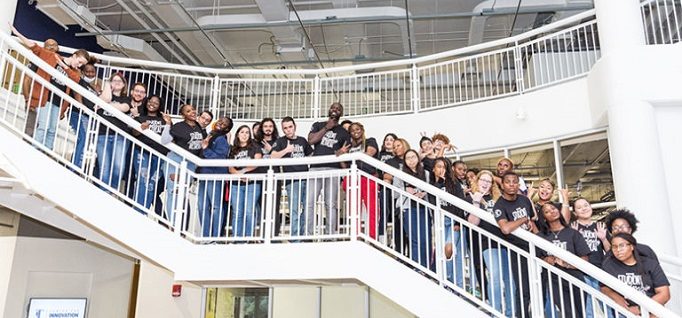Bringing underrepresented students into STEM
By Madeline Patton
November 3, 2021
Community colleges share promising practices for diversifying STEM programs
Part of the National Science Foundation’s (NSF) mission is “to recruit, retain and develop a diverse, high-performing workforce that draws from all segments of society and values fairness, diversity, and inclusion to promote the progress of science.”
The NSF’s Advanced Technological Education (ATE) program provides grants to STEM faculty at community colleges to develop innovative programs that support the recruitment and retention of “groups historically underrepresented in STEM in technician education programs that award associate degrees.”
At the 28th ATE Principal Investigators’ Conference, participants had the opportunity to learn from community colleges educators and the leader of a grassroots organization about the ways they blend diversity, equity and inclusion (DEI) initiatives with promotion of STEM careers. Six speakers shared information about their effective practices during two conference sessions.
Start with individual greetings
When she was a math professor, Calandra Stringer, provost and vice president of academic affairs of Tallahassee Community College (TCC) in Florida, made a point of greeting students as they entered her classroom. She also invited students to visit her during office hours to work on particular math problems.
“Really making sure you understand your students and what’s relevant to them” helps bridge cultural, ethnic and economic differences, she said.
Now when she talks to students about their career interests or hobbies, or engages them in conversations about how to improve things at the college, Stringer is also listening for connections between their interests and STEM careers they may not know about. When relevant, she points students to college programs related to the topics they mention.
“It’s a long journey – it starts early,” she said.
DEI programs at TCC include its Student Leadership Retreat, the Hispanic Alliance and the Scholar Program.
Build a growth mindset
Chuck Benton, a biology professor at Madison Area Technical College (Madison College) in Wisconsin and co-coordinator of the STEM Scholars Program, explained why the WiscAMP Scholars Program focuses on developing a “growth mindset” among students and how it does it.
Madison College student surveys identified the biggest obstacles to persistence and completion among underrepresented populations as: deficits in “belongingness”; not feeling supported; and financial pressures. A factor contributing to these three issues is that students often take too many courses and work too many hours, he said.
The WiscAMP Scholars Program for STEM majors offers faculty mentoring stipends, ranging from $500 to $4,000, and life skills programs.
Stipend funds come from a Louis Stokes Alliances for Minority Participation grant the college received from the National Science Foundation, which funds ATE programs and sponsored the ATE conference last week. The stipends “incentivize participation in the program and decrease the hours students have to work off-campus,” Benton said, explaining that this allows students to spend more time on extracurricular and co-curricular activities that help them feel more connected to the college.
Every WiscAMP Scholar is paired with a STEM faculty mentor who meets with them one-on-one twice a month to “help students develop their problem-solving skills and address challenges.” Students also meet once a semester with a faculty STEM advisor in their area of career interest to plan their schedules and transfer to baccalaureate institutions.
As the vanguard of the “growth mindset” effort, the mentors receive reports from instructors about how their mentees are doing in their classes.
“It’s very important that students have timely feedback on their performance so they can make adjustments and they can address any challenges that they are having,” Benton said.
The mentors guide mentees’ troubleshooting and connect them with resources.
“Having students understand that their abilities are not fixed and that they can develop. If they don’t feel confident in math or in science, right, that’s not something that can’t be improved,” added Benton, who promotes this in his biology class by allowing students to take quizzes multiple times.
Twice a month the WiscAMP Scholars interact with each other during programs on topics such as budgeting, obtaining an internship, building a personal brand, and preparing for transfer.
“We’re trying to build a community and allow students to see themselves as part of the STEM community,” Benton said.
Of the 69 students who participated in the program from fall 2017 to spring 2020, 61% completed an associate degree and 45% transferred. See this video for an overview of the program.
Take a systemic approach
Maureen Murphy, president of the College of Southern Maryland (CSM), said that the Covid pandemic pointed out that the “structure of academic institutions doesn’t match the lives of its students.” She is directing the “once-in-a-generation resources” that are currently available to deal with the crisis for systemic changes that address DEI issues.
For instance, the college strategically used crisis funds to reach geographically marginalized people by adding wi-fi cafes, simulcasts of programs, and virtual reality labs for healthcare and engineering courses.
Murphy said six new start dates have been added to the academic calendar because “the traditional schedule doesn’t match the complicated lives of the people who need us most.”
She said the college will continue to support initiatives that develop a STEM “habit of mind,” which she defines as the disciplined way of thinking about problems that science education promotes. These initiatives include the Society of Black Engineers club, summer STEM camps for students as young as third grade, the Engineer Like a Girl program for high school girls, the Men of Excellence program for African-American male students, and the community makerspace within the CSM Velocity Center.
There’s more to the story! Read the full article in CC Daily.



